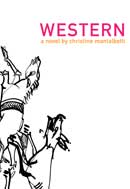

Dalkey Archive, paperback, 9781564785282
Christine Montalbetti is a woman after my own heart! For as long as I can remember, any attempt of mine to tell a story has been met by despairing cries of 'get to the point!' and 'is this relevant?' from friends and family who fail to share my fascination for life's smaller details. What a lot I have to learn, it turns out! I'm just a novice, flirting with trivial little bits of detail to pad out my main story, whilst Montalbetti has written a whole novel about those tiny details that never usually get told; in fact this is a new take on the action-based Western genre...without much action.
If you think about it, you'll realise that, in the telling of any story, an enormous proportion of 'what happens' is discarded. Not here! The novel opens with the main character, referred to until the last few pages only as 'our thirty-year-old', sitting on the porch at dawn—but don't expect a description of his appearance followed by a few lyrical sentences about the sunrise. Instead Montalbetti zooms in on the movement made by his leg to rock the chair: he 'relaxes the flexors of the foot, meaning, I think, the anterior leg muscle, and perhaps also, at the same time, the lateral peroneous longus, you can't exclude that possibility (I'm doing it myself, to try and feel what muscles I'm using, but even so, identifying them is not so easy).' After this we see the same scene again, this time from the viewpoint of the ants scurrying along the rail on which the cowboy's foot is resting—until he stamps his foot to get his circulation going, that is, leaving 'some of the victims [...] so deformed by the blow that you can no longer make out their features'.
As our cowboy (a mysterious stranger in town) goes about his day, Montalbetti constantly veers off, distracted by another tiny detail, maddenly yet wonderfully postponing the novel's climax (the action). Elements that usually exist only in the background are suddenly thrust into the limelight—the different-coloured hairs in one man's moustache, for example ("with hairs of both colours engaged in a merciless battle for priority on his upper lip"). Along with dizzying changes of subject, Montalbetti inserts endless changes of focus: What would characters in her other novels have made of this? What would other writers do now?
This is a not a relaxing novel to read; it demands that one sit up and pay attention, but a
reader willing to make the investment will be whirled off into an exhilarating microscopic world.
(The bad news for my family and friends is that it has made me even more interested in those
"insignificant" little details!)